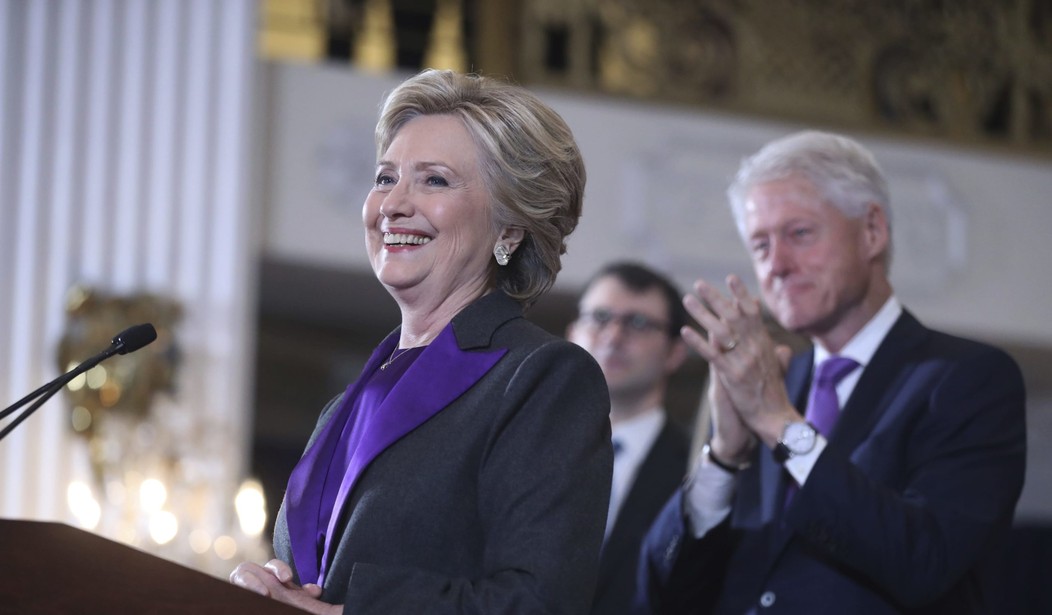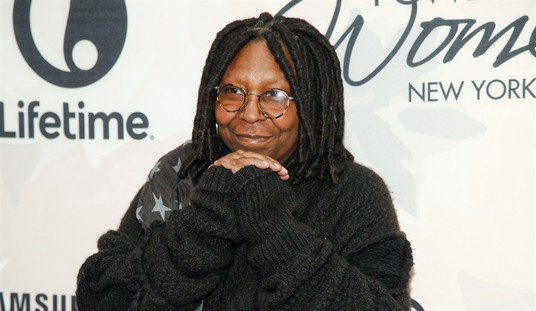This is how Trump will fade. Democrats will simply say they were thinking the same thing all along. “In an interview with the Guardian, [Hillary Clinton] the former Democratic presidential candidate… suggested immigration was inflaming voters and contributed to the election of Donald Trump and Britain’s vote to leave the EU.”
“I think Europe needs to get a handle on migration because that is what lit the flame,” Clinton said, speaking as part of a series of interviews with senior centrist political figures about the rise of populists, particularly on the right, in Europe and the Americas. …
“I admire the very generous and compassionate approaches that were taken particularly by leaders like Angela Merkel, but I think it is fair to say Europe has done its part, and must send a very clear message – ‘we are not going to be able to continue provide refuge and support’ – because if we don’t deal with the migration issue it will continue to roil the body politic.” …
Clinton was one of three heavyweights of the centre-left interviewed by the Guardian … The other two interviewees, Tony Blair and Matteo Renzi, agreed that the migration issue had posed significant problems for centrist politics.
“You’ve got to deal with the legitimate grievances and answer them, which is why today in Europe you cannot possibly stand for election unless you’ve got a strong position on immigration because people are worried about it,” Blair said. “You’ve got to answer those problems. If you don’t answer them then … you leave a large space into which the populists can march.”
Co-opting the talking points of political foes and taking credit for their achievements is a time-honored tactic. Today Jimmy Carter is given partial credit for winning the Cold War. “Carter escalated the Cold War by ending détente, imposing a grain embargo against the Soviets, enunciating the Carter doctrine, and leading an international boycott of the 1980 Summer Olympics in Moscow.”
Similarly, it is now fashionable to assert that the EU, not American power, kept the peace. After all, they won the 2012 Nobel Peace Prize. “The Norwegian Nobel Committee said its decision was based on the stabilising role the EU has played in transforming most of Europe from a continent of war to a continent of peace.”
Did Ronald Reagan receive any such honor? Why should we credit him with it?
Barack Obama has already laid claim to the current economic upturn. Speaking of the current favorable situation, the New York Times reported: “Trump Claims Credit for the Economy. Not So Fast, Says Obama. The economy is doing quite well, thank you very much, and the president would naturally like to take credit. Both of them.”
Barely a day passes without President Trump boasting about the growing economy, claiming with a mix of hyperbole and fact that it is “booming like never before.” But former President Barack Obama finds all the Trumpian chest-thumping more than a little grating, given that the “booming” started on his watch.
Of course, some people think it was really Barack Obama who defeated ISIS. Explaining the defeat of ISIS, the Washington Post writes, “Obama’s ISIS policy is working for Trump … an acknowledgment that in Syria, Trump is using President Barack Obama’s playbook. So far, it’s working out pretty well for him.”
No doubt the credit for successful policies never originates with a single administration but rather with several, and the desire to receive credit should never get in the way of simply doing the right thing. Ronald Reagan famously said, “There is no limit to the amount of good you can do if you don’t care who gets the credit” — perhaps because he knew that public memory was as short as the news cycle can make it.
Who now can remember, as progressives cast themselves as the defenders against the Russian menace, how recently president Obama laughed at Mitt Romney’s suggestion that the Kremlin could ever be a threat? Ha ha. But it’s enough perhaps that Russia is finally facing one of the biggest military buildups since the end of the Cold War, whoever ordered it — though some will point out no doubt that the buildup may have begun in Obama’s final year, when “reality finally kicked in.”
Plagiarism is the sincerest form of imitation. Clinton’s realization that mass immigration must be adapted to suit the actual conditions is a sign that the populist revolution, though it may be checked or superseded, has left an indelible mark. Trump may be impeached, though probably not convicted, in the coming months; certainly he will, like all mortal flesh, eventually fade away. But there’s no denying time has moved the needle and there is no way back to the global world paradigm of 2016.
Whatever befall, it seems probable that the open borders immigration policy will finally be amended. There will be a Space Force. America will confront China, peacefully but forcefully, instead of giving way continuously. Russia, now balked, will either reform itself or decline. America will continue to move toward energy independence. Bloomberg notes: Ttotal U.S. production rising at fastest pace in 98 years. The map lays out OPEC’s nightmare in graphic form. An infestation of dots, thousands of them, represent oil wells in the Permian basin … Many … would turn a profit … as low as $30 a barrel.”
OPEC’s bad dream only deepens next year, when Permian producers expect to iron out distribution snags that will add three pipelines and as much as 2 million barrels of oil a day. …
The U.S. energy surge presents OPEC with one of the biggest challenges of its 60-year history. If Saudi Arabia and its allies cut production when they gather Dec. 6 in Vienna, higher prices would allow shale to steal market share. But because the Saudis need higher crude prices to make money than U.S. producers, OPEC can’t afford to let prices fall.
But fall they might — they may have no choice. Admirers of the late Jamal Khashoggi can take comfort in the cold fact that each dollar the price of oil drops does more to denounce the kingdom than ten thousand editorials in the Washington Post — though it hurts Iran and Russia too. Despite the pious assertion that the West can’t drill its way to energy independence, apparently, it can. It’s the frackers not the Woke that Mohammad bin Salman really has to fear.
“Amateurs talk about tactics, but professionals study logistics.” Who said that? Who made it possible? We can credit Hillary Clinton if necessary, so long as it works.
Follow Wretchard on Twitter
For a list of books most frequently purchased by readers, visit my homepage.
Support the Belmont Club by purchasing from Amazon through the links below.
Books:
Custer’s Trials: A Life on the Frontier of a New America, by T.J. Stiles. Winner of the 2016 Pulitzer Prize in History, this book paints a portrait of Custer that demolishes historical caricature, revealing a volatile, contradictory, intense person — capable yet insecure, intelligent yet bigoted, passionate yet self-destructive, a romantic individualist at odds with the institution of the military (he was court-martialed twice in six years). The key to understanding Custer, Stiles writes, is keeping in mind that he lived on a frontier in time. In the Civil War, the West, and many other areas, Custer helped to create modern America, but could never adapt to it. Stiles casts surprising new light on a near-mythic American figure, a man both widely known and little understood.
Tribe: On Homecoming and Belonging, by Sebastian Junger. We have a strong instinct to belong to small groups defined by clear purpose and understanding or “tribes,” a connection now largely lost. But its pull on us remains and is exemplified by combat veterans who find themselves missing the intimate bonds of platoon life at the end of deployment and the high rates of post-traumatic stress disorder suffered by military veterans today. Combining history, psychology, and anthropology, Junger explores what we can learn from tribal societies about loyalty, belonging, and the eternal human quest for meaning. He explains why we are stronger when we come together, and how that can be achieved even in today’s divided world.
For a list of books most frequently purchased by readers, visit my homepage.
Did you know that you can purchase some of these books and pamphlets by Richard Fernandez and share them with your friends? They will receive a link in their email and it will automatically give them access to a Kindle reader on their smartphone, computer or even as a web-readable document.
The War of the Words, Understanding the crisis of the early 21st century in terms of information corruption in the financial, security and political spheres
Rebranding Christianity, or why the truth shall make you free
The Three Conjectures, reflections on terrorism and the nuclear age
Storming the Castle, why government should get small
No Way In at Amazon Kindle. Fiction. A flight into peril, flashbacks to underground action.
Storm Over the South China Sea, how China is restarting history in the Pacific
Tip Jar or Subscribe or Unsubscribe to the Belmont Club










Join the conversation as a VIP Member